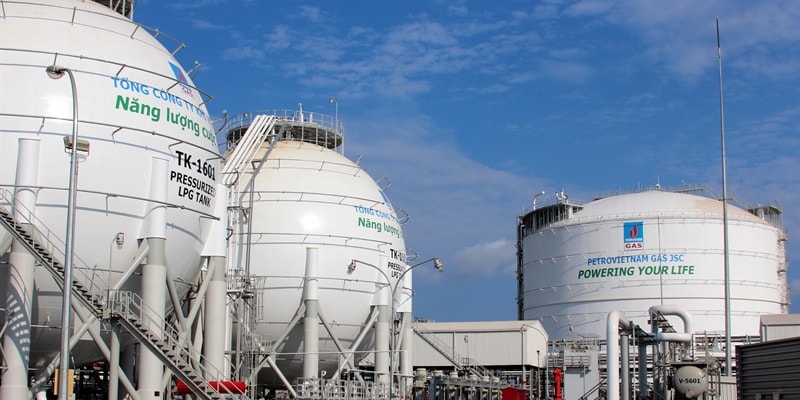Many listed companies race to raise capital ahead of market upgrade
Compared to the beginning of the year, many stock prices have doubled along with record-breaking liquidity. Seizing the momentum, a number of companies are accelerating share issuance plans to raise capital.

Along with cash dividends, on August 28 GAS is expected to issue nearly 70.3 million new shares, raising its charter capital to almost VND 24.13 trillion…
The Capital-Raising Rush
During the week of August 25–29, 2025, just before the September 2nd holiday, many companies announced ex-dividend dates for cash payouts. Yet most chose to issue shares and stock bonuses to boost capital ahead of the anticipated market reclassification.
On August 28, PV Gas (GAS) will trade ex-dividend to distribute VND 2,100 per share, amounting to nearly VND 4.92 trillion in cash dividends. Payment is scheduled for November 25. As Vietnam Oil and Gas Group (PVN) holds a 95.76% stake, the State will receive the bulk of this payout.
Beyond cash dividends, GAS has also consistently issued bonus shares in the past two years. This time, alongside dividends, it will issue shares at a 3% rate—meaning shareholders with 100 shares will receive three additional shares. The issuance of nearly 70.3 million shares will raise GAS’s charter capital to almost VND 24.13 trillion. Despite this, GAS stock remains around its year-start lows.
Hoang Huy Investment & Financial Services JSC (TCH) will also offer more than 200 million shares to existing shareholders at a ratio of 10:3. Registration and payment run from August 27 to September 15 at VND 10,000 per share—less than half of TCH’s current market price. The offering aims to raise nearly VND 2.005 trillion, funding the Hoang Huy Green River project (VND 1.2 trillion) and the Hoang Huy Commerce H2 tower project (VND 805 billion).
Meanwhile, Development Investment Construction Corp. (DIG) has revived its plan to issue 150 million shares at a ratio of 1,000:232 and a price of VND 12,000 per share, expected to raise VND 1.8 trillion between Q3/2025 and Q1/2026. DIG shares have nearly doubled in price since the beginning of the year.
Brokerage firms are also racing to raise capital. ACBS has already increased charter capital from VND 7 trillion to VND 10 trillion this year, backed by parent bank ACB. In March 2025, ACB’s board further approved an additional VND 1 trillion injection to lift ACBS’s capital to VND 11 trillion.
MBS issued 94.5 million shares via rights offerings, stock bonuses, and ESOP, raising VND 945 billion and bringing its capital to VND 6.673 trillion. SHS increased capital by VND 814 billion to VND 8.945 trillion through stock dividends and bonuses. VDSC raised VND 243 billion to VND 2.673 trillion via a 24.3 million share dividend payout and has plans to push capital further to VND 3.2 trillion through ESOP and strategic placements.
The main driver behind securities firms’ capital hikes is to expand margin lending capacity as demand for leverage grows again with the market at record highs. With GDP growth of 7.96% in Q2 and 7.52% in the first half of the year, coupled with expansionary fiscal and monetary policies and progress in tariff negotiations with the U.S., Vietnam’s stock market is expected to continue its upward trajectory.
Raising Capital, Positioning for Upgrade
For many companies, raising capital through the stock market is a once-in-a-generation opportunity to secure stronger financial resources for production, business expansion, and debt repayment—particularly in the real estate sector.
For brokerages, higher capital not only lowers margin lending rates in an increasingly competitive landscape but also ensures compliance with stricter capital adequacy ratio (NCR) requirements set by the State Securities Commission. Larger equity also enables firms to expand proprietary trading portfolios, positioning themselves for Vietnam’s potential upgrade to emerging market status—possibly as early as the FTSE review this September.
The World Bank estimates that a successful market upgrade could attract up to USD 25 billion in new international investment into Vietnam’s stock market by 2030.
Still, the wave of capital raising poses risks. Analysts warn of share dilution—where an increase in outstanding shares reduces ownership percentages of existing shareholders, affecting voting rights, earnings per share (EPS), and other entitlements.
That said, despite the short-term dilution effect, these capital plans also bring long-term benefits: securing funds for expansion, strengthening competitiveness, and sustaining growth momentum. After all, opportunities to tap favorable equity markets do not come often.








